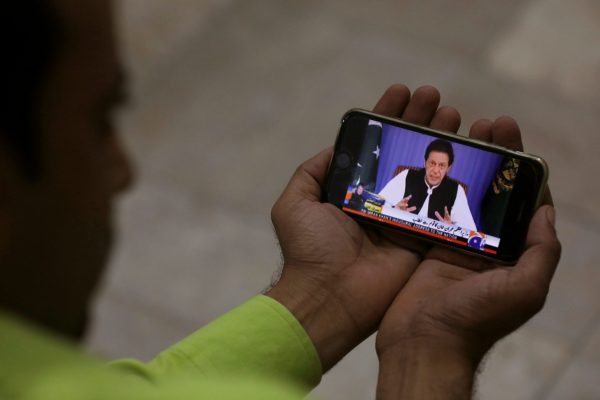The PTI strategy involved aligning itself with the military and judiciary, incorporating defectors from other parties, employing data-mining techniques and urging voters to decide in favour of the party leader rather than in favour of the party’s candidates in individual constituencies. The sordid pasts of individual candidates may have otherwise discouraged support for the PTI.
The combination of idealistic rhetoric, pragmatic politics and technical savvy yielded the PTI a two-thirds majority in the Khyber Pakhtunkhwa provincial assembly, near majorities in Punjab and the centre, significant inroads in Karachi and a pro-PTI coalition in Balochistan. Predictably, the losers are demanding probes and commissions. Uncharacteristically for a winning party, the PTI has offered to cooperate with inquiries into alleged rigging.
The PTI’s victory heralds the decline of dynastic patronage politics at the national level and the advent of a populist centre-right regime that draws strength from a coalescence of middle-class, activist-judiciary and hyper-autonomous military interests. The challenges before this emergent power configuration are immense. They include crippling external financial balances, soaring circular debt in the power sector, rapidly depleting water reserves, a catastrophic demographic profile, an unresponsive civilian administration, growing radicalisation, the India–Pakistan nuclear powder keg and US estrangement.
Pakistan has, since 1980, been to the International Monetary Fund (IMF) 14 times. The story is almost always the same. Pakistan cannot earn enough to pay for its imports or to service its foreign debt. Rather than fix underlying problems in the economy, civilian and military rulers head to the IMF seeking a bailout. Once the bailout is secure, policy autonomy is lost. Cosmetic tinkering keeps the tranches coming and the status quo gains a new lease on life. Pakistan exits the program, goes on a spending spree and ends up seeking another bailout.
This time Pakistan needs an estimated US$12–25 billion to ride out the crunch. The trouble for the PTI is that going to the IMF will severely diminish prospects for meaningful change while exacting a very high political cost. All indications suggest that the new government does not want to seek an IMF bailout and is earnestly examining alternatives: bilateral assistance from Saudi Arabia and China, savings schemes for expatriates, a sovereign wealth fund, privatisation and floating additional bonds.
With much of the new government’s attention directed towards averting financial meltdown, it is not clear how much political capital it will be able to invest toward solving other serious problems. The ecological collapse of the Indus Basin under the mutually reinforcing pressures of rapid population growth, pollution, dysfunctional governance and declining water availability and quality is now imminent. Nothing short of declaring a national emergency and taking serious action can stop critical tipping points being crossed in the next few years.
Then there is governance. In Khyber Pakhtunkhwa, the PTI has had some success in reforming the police force and improving service delivery at the local level. The lessons learned here will now have to be applied to Punjab and at the federal level. In the long run, rebuilding Pakistan’s civilian bureaucracy is the only sustainable way to improve public services.
A more autonomous, honest and effective state apparatus would, in time, shift the balance of competence in favour of civilian actors and away from the military. There is plenty of sound advice gathering dust in Pakistan’s archives on what to do on this front. As long as the new government can steer clear of mercenary jargon-mongers and draw upon the wealth of perspective lying in its own records, it should have a decent chance of making progress.
Maintaining regime coherence by managing relations with the judiciary and the military will not be easy. On the foreign affairs front, Pakistan’s military dominates decision making and is wedded to a national security outlook that defines the country’s geostrategic importance in almost entirely negative terms. This is unlikely to change appreciably under the new government.
On the domestic front, Pakistan’s judiciary — which enjoys genuine popularity — has since 2005 pursued an activist and populist policy of intervention on public issues. It played a decisive role in the downfall of the Musharraf military regime and sent two democratically elected prime ministers packing in the past decade.
The only real weapon that a prime minister has as the junior partner in the military–judiciary–government troika is to call early elections. But this is something that no elected government in Pakistan has been willing to do. The political classes subscribe to the myth that riding out a five-year term is somehow essential to democratic consolidation.
Imran Khan has promised clean, effective and accountable government. As the PTI assumes charge, its supporters await national redemption. History indicates that the new government will be rapidly subdued by financial constraints, the need to maintain political support in Punjab and the threat of chastisement from the military and judiciary.
Although the PTI’s victory furnishes evidence that Pakistan is capable of political change, the burden of history, soaring expectations and the significant residual strength of the opposition ought to be sobering for Khan and his team. Whatever else one might think, the one luxury the PTI does not have is delaying difficult decisions. Whether or not the PTI will be able to reform the civilian bureaucracy and carry Pakistan’s powerful non-democratic power centres with it will likely determine its success or failure.
Ilhan Niaz is Associate Professor of History at Quaid-i-Azam University, Islamabad.


While Imran Khan has made studying the Quran Compulsory in all schools (Students of the Quran are known as Taliban) to Talibanize Pakistan, many a kite is being flown as if his intentions are otherwise: